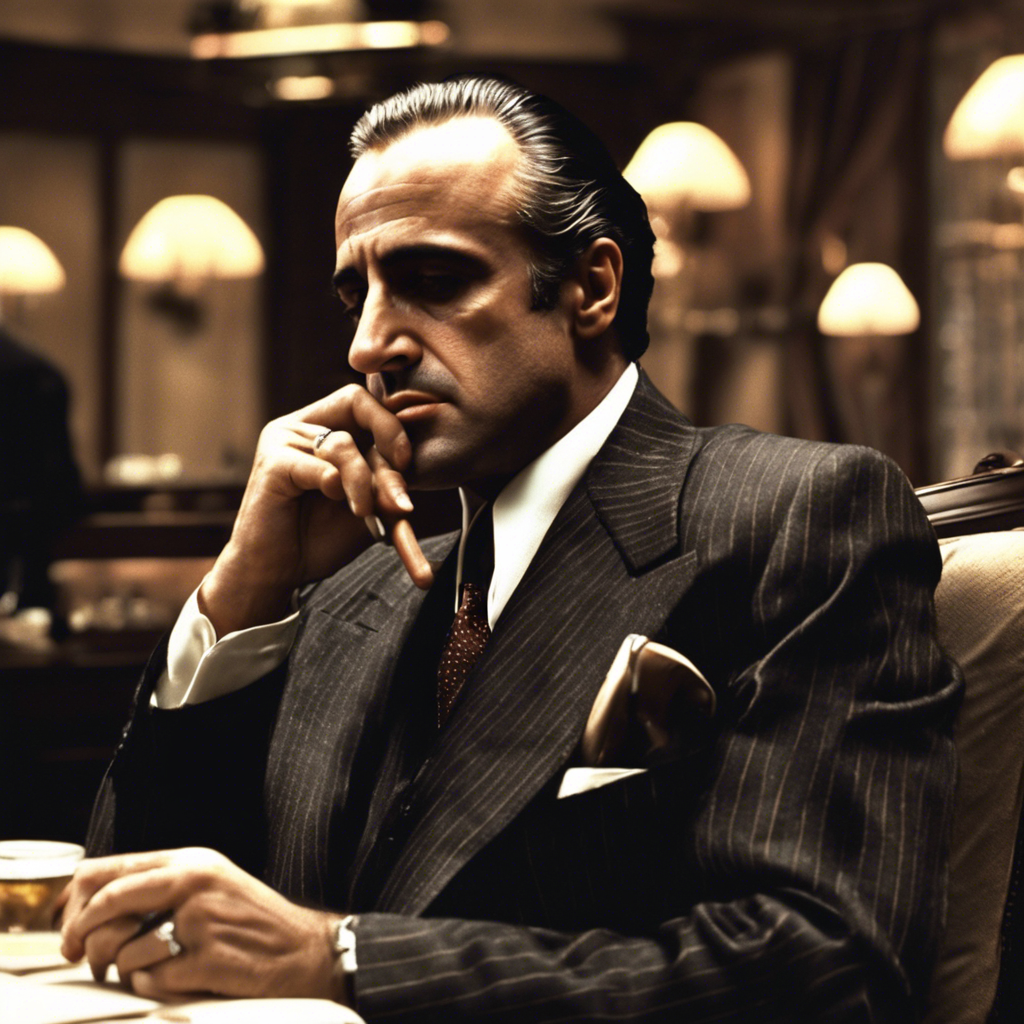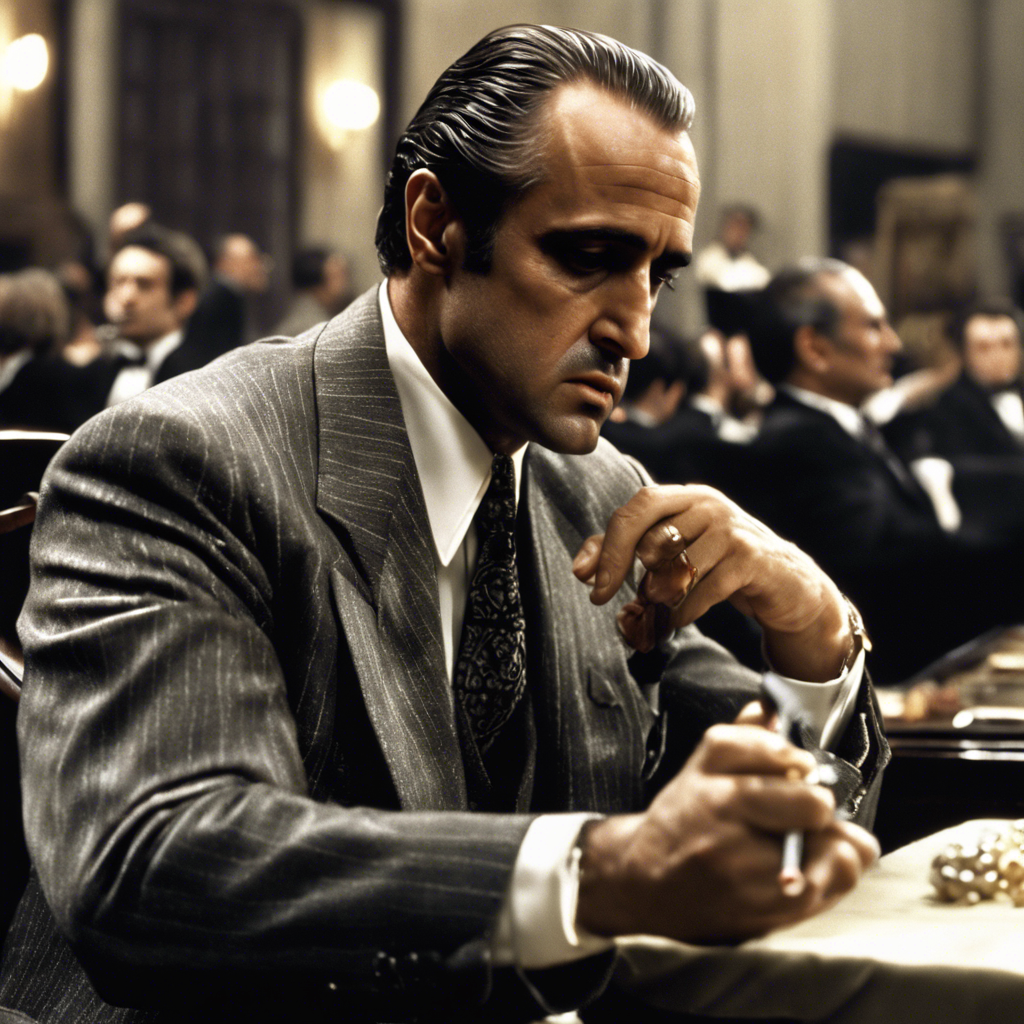The Godfather , directed by Francis Ford Coppola, is a cinematic masterpiece that has solidified its place in the annals of film history. Released in 1972, this iconic movie continues to captivate audiences with its compelling narrative, exceptional performances, and timeless themes that resonate to this day.

The Plot
Set in the post-World War II era, The Godfather presents a compelling narrative that goes beyond the surface portrayal of a crime family. The intricate web of relationships within the Corleone clan is a central theme that adds layers of complexity to the storyline. Vito Corleone's character is not just a mob boss but a man of principles and honor, who operates within a code of ethics that is both brutal and unwavering. Marlon Brando's portrayal adds a depth to the character, showcasing the internal conflicts and moral dilemmas faced by a man in his position.
As the narrative unfolds, the audience is taken on a journey through the evolution of Michael Corleone, a character brilliantly brought to life by Al Pacino. Michael's transformation from a war hero with no interest in the family business to a ruthless leader willing to do whatever it takes to protect his family's legacy is a central arc that drives the plot forward. The film explores the themes of power and corruption, as Michael grapples with his own morality and the dark path he must walk to ensure the survival of the Corleone family.
Through its masterful storytelling and nuanced character development, The Godfather immerses viewers in a world where loyalty and betrayal walk hand in hand, and where the line between right and wrong is often blurred. The film's exploration of family dynamics, honor, and the consequences of choices made in the pursuit of power make it a timeless classic that continues to resonate with audiences around the world.
Themes and Impact
One of the most remarkable aspects of The Godfather is its ability to intricately weave together a complex tapestry of themes that resonate deeply with audiences across generations. At the heart of the film is the exploration of the delicate interplay between family dynamics and the criminal underworld, showcasing how loyalty and love can often become entangled with violence and betrayal. This juxtaposition of familial bonds with the ruthless pursuit of power creates a tension that drives the narrative forward, compelling viewers to reflect on the blurred lines between right and wrong.
Furthermore, The Godfather masterfully navigates the clash between tradition and modernity, presenting a world where age-old customs and values collide with the relentless march of progress. The Corleone family, with its deeply entrenched traditions and codes of honor, finds itself at odds with a changing society that is increasingly driven by ambition and opportunism. This conflict serves as a poignant reflection of the broader societal shifts taking place during the 1970s, highlighting the tensions between the old guard and the new order.
Central to the film's narrative is the exploration of power and its corrupting influence on those who wield it. As the characters navigate the treacherous waters of organized crime, they are forced to confront the moral compromises and ethical dilemmas that come with the pursuit of power. The film deftly examines how power can seduce and corrupt even the most virtuous individuals, leading them down a path of darkness and moral decay.
Through its rich storytelling and nuanced character development, The Godfather offers a profound meditation on the complexities of the human experience. It invites viewers to ponder the consequences of the choices we make, the values we uphold, and the legacies we leave behind. In doing so, the film transcends its status as a mere gangster epic and emerges as a timeless masterpiece that continues to captivate and provoke audiences to this day.
Visual Aesthetics
Coppola's direction elevates The Godfather to a visual and sensory experience like no other. From the iconic opening sequence to the haunting score composed by Nino Rota, every frame is meticulously crafted to immerse the audience in the world of the Corleone family. The cinematography, characterized by its rich color palette and atmospheric lighting, enhances the film's dramatic tension and emotional depth, drawing viewers into the morally complex universe of the mafia.

Timeless Performances
The stellar ensemble cast of The Godfather delivers unforgettable performances that have etched themselves into cinematic history. Marlon Brando's portrayal of Vito Corleone is a masterclass in acting, earning him an Academy Award for Best Actor. Al Pacino's portrayal of Michael Corleone is equally compelling, charting the character's moral descent with a quiet intensity that is both chilling and mesmerizing. The supporting cast, including James Caan, Robert Duvall, and Diane Keaton, adds layers of complexity to the narrative, bringing to life a vivid and unforgettable tapestry of characters.
Legacy and Influence
Even five decades after its release, The Godfather continues to hold a significant place in the history of cinema. The film, directed by Francis Ford Coppola, not only captivated audiences with its compelling storytelling and powerful performances but also left an indelible mark on the cultural landscape. Through its portrayal of the Corleone crime family, The Godfather delved into themes of power, loyalty, and betrayal, resonating with viewers on a profound level.
One of the key reasons for the enduring appeal of The Godfather is its iconic dialogue, which has become iconic in its own right. Lines like "I'm gonna make him an offer he can't refuse" have transcended the film itself to become part of popular lexicon, referenced and parodied in various forms of media. The film's impact extends beyond the screen, influencing not just filmmakers but also writers, musicians, and artists across different disciplines.
Moreover, The Godfather paved the way for a new era of gangster films, setting a high standard for storytelling and character development in the genre. Its success inspired a wave of crime dramas that sought to emulate its gritty realism and moral complexity. The film's legacy can be seen in works ranging from Goodfellas to The Sopranos, each paying homage to the groundbreaking nature of Coppola's masterpiece.
Furthermore, The Godfather has not only influenced subsequent films and television series but has also made its mark on other forms of entertainment, including video games. The themes of family, power, and honor explored in the film have been adapted into interactive experiences that allow players to immerse themselves in the world of organized crime. This cross-media influence speaks to the timeless quality of The Godfather and its ability to resonate with audiences across different mediums.
Final Verdict
In conclusion, The Godfather is a cinematic tour de force that stands the test of time as a crowning achievement in storytelling and filmmaking. With its gripping narrative, powerhouse performances, and evocative visual style, the movie remains a must-watch for cinephiles and casual viewers alike. Whether you're drawn to tales of power and family dynamics or simply appreciate the art of storytelling at its finest, The Godfather is a film that demands to be experienced and savored for generations to come.

Let The Godfather transport you into a world of intrigue, honor, and betrayal, where the line between right and wrong blurs, and the consequences of one's choices reverberate through generations. Embrace the cinematic masterpiece that is The Godfather and discover why it continues to reign as one of the greatest films ever made.
Remember – "A man who doesn't spend time with his family can never be a real man." - Don Vito Corleone
Comentarios